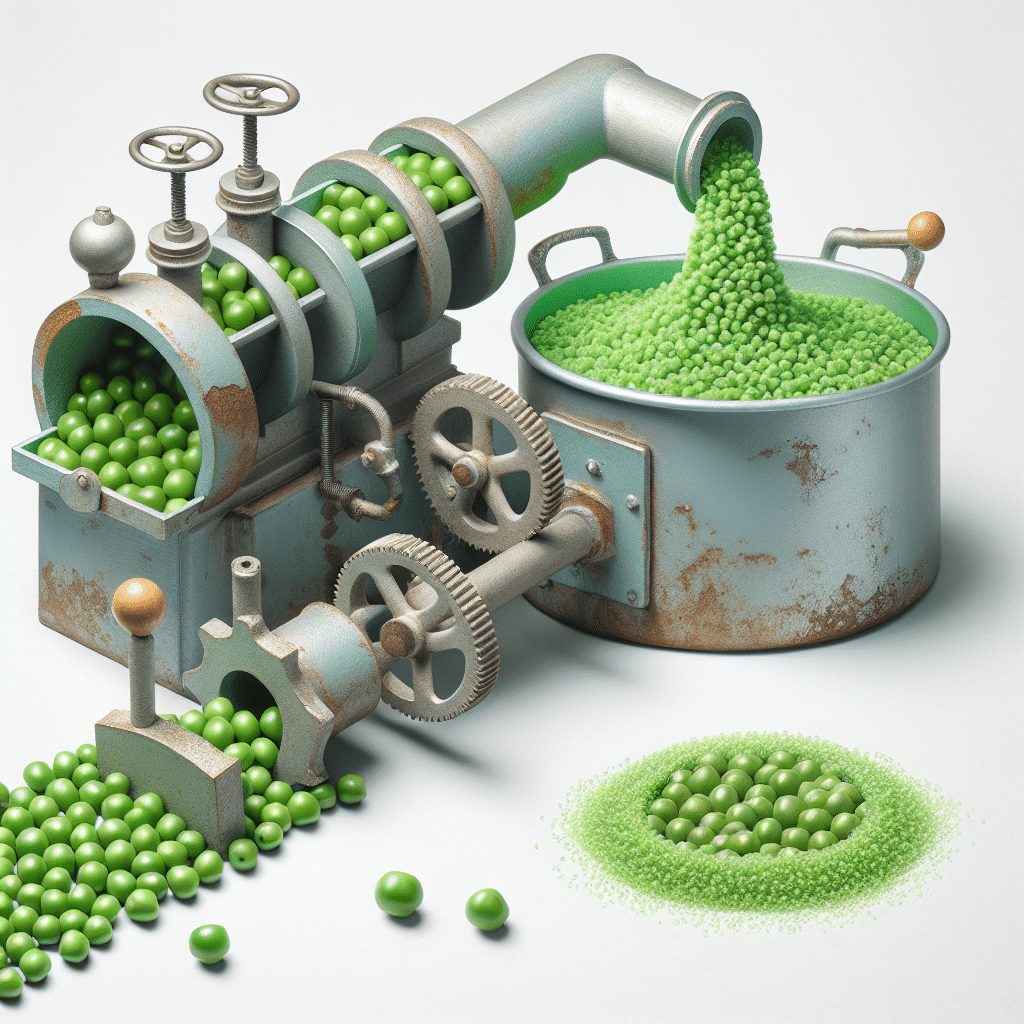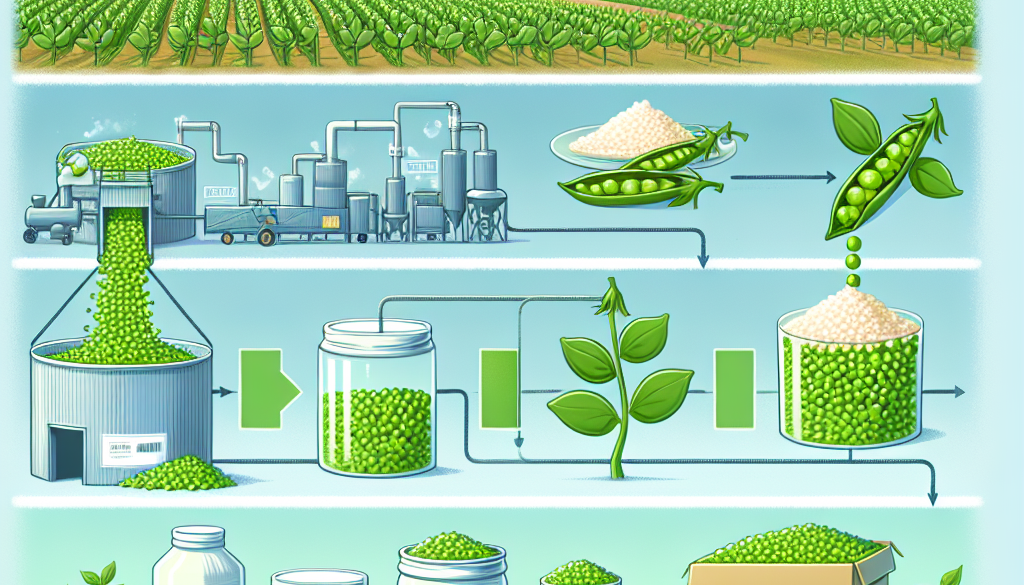Is Pea Protein Overly Processed?
-
Table of Contents
- Pea Protein: Assessing the Extent of Processing in Plant-Based Proteins
- Understanding Pea Protein Production
- Is Pea Protein Overly Processed?
- Comparing Processing Levels
- Health Implications of Processed Pea Protein
- Environmental and Ethical Considerations
- Case Studies and Statistics
- Conclusion: Balancing Processing and Nutrition
- Discover ETprotein’s High-Quality Pea Protein Products
Pea Protein: Assessing the Extent of Processing in Plant-Based Proteins

As the demand for plant-based proteins continues to rise, consumers are becoming increasingly conscious of the ingredients in their food, including where they come from and how they are processed. Pea protein has emerged as a popular alternative to animal-based proteins, but questions about its processing methods have sparked discussions among health enthusiasts and experts alike. This article delves into the production of pea protein to determine whether it is overly processed or a healthy addition to a balanced diet.
Understanding Pea Protein Production
Pea protein is derived from yellow split peas and is a favored ingredient in many vegan and vegetarian products due to its high protein content and hypoallergenic properties. The process of making pea protein involves several steps:
- Harvesting and cleaning the peas to remove impurities.
- Milling the peas into flour.
- Separating the protein from the fiber and starch through a water-based process.
- Drying the separated protein into a powder form.
While this process may seem straightforward, the concern arises when additional steps are taken to isolate the protein, which can involve various methods of filtration and purification.
Is Pea Protein Overly Processed?
To address the question of whether pea protein is overly processed, it’s essential to consider the methods used to isolate the protein and the impact on its nutritional profile. The primary concern is that processing can strip away other beneficial nutrients found in whole peas, such as fiber, vitamins, and minerals.
However, it’s important to note that the degree of processing can vary between manufacturers. Some brands opt for minimal processing techniques to maintain a more natural nutrient profile, while others may use more intensive methods to achieve a higher protein concentration or a smoother texture.
Comparing Processing Levels
When evaluating the processing levels of pea protein, it’s useful to compare it to other protein sources:
- Animal Proteins: Animal-based proteins undergo various degrees of processing, from minimal (e.g., grilled chicken breast) to extensive (e.g., deli meats).
- Soy Protein: Similar to pea protein, soy protein isolate is heavily processed to remove fats and carbohydrates.
- Whey Protein: Whey protein is a byproduct of cheese production and undergoes processing to isolate the protein.
Compared to these examples, pea protein’s processing is not necessarily excessive, especially when considering that all isolated proteins require some level of processing to extract them from their original food source.
Health Implications of Processed Pea Protein
Despite the processing involved, pea protein retains a high level of its original plant-based nutrients. It is rich in essential amino acids, making it a complete protein source for those on a plant-based diet. Additionally, pea protein is free from common allergens like gluten, dairy, and soy, making it suitable for individuals with food sensitivities.
Some studies suggest that the bioavailability of protein in pea protein powder is comparable to that of dairy-based proteins, indicating that the processing does not significantly diminish its nutritional value.
Environmental and Ethical Considerations
Aside from health concerns, many consumers choose pea protein for its lower environmental impact compared to animal-based proteins. Peas require less water and land to grow and do not produce the same level of greenhouse gases as livestock farming.
Moreover, pea protein aligns with ethical considerations for those who follow a vegan or vegetarian lifestyle, as it does not involve animal products or byproducts.
Case Studies and Statistics
Several studies have highlighted the benefits of pea protein. For instance, a 2015 study published in the Journal of the International Society of Sports Nutrition found that pea protein promoted muscle thickness gains just as effectively as dairy-based whey protein in athletes.
Market research also supports the growing popularity of pea protein. According to a report by MarketsandMarkets, the global pea protein market size is projected to reach USD 1.4 billion by 2025, growing at a CAGR of 13.5% from 2020 to 2025. This growth is attributed to the rising consumer interest in plant-based diets and sustainable food sources.
Conclusion: Balancing Processing and Nutrition
In conclusion, while pea protein does undergo processing to isolate the protein from the peas, it is not necessarily “overly” processed, especially when compared to other protein sources. The key is to choose high-quality pea protein products from reputable manufacturers that prioritize minimal processing techniques to maintain the nutritional integrity of the protein.
Consumers should also consider the broader benefits of pea protein, including its environmental sustainability and suitability for those with dietary restrictions. By doing so, they can make informed decisions about incorporating pea protein into their diets.
Discover ETprotein’s High-Quality Pea Protein Products
If you’re looking for top-notch pea protein products, ETprotein offers a range of options that cater to various needs. Their pea protein is characterized by a neutral taste, non-GMO, and allergen-free attributes, ensuring that you receive a product that is not only healthy but also environmentally conscious.
ETprotein’s commitment to quality and sustainability makes them a leading choice for consumers seeking plant-based protein solutions. To explore their offerings and learn more about how their pea protein can benefit your diet, contact ETprotein and email sales(at)ETprotein.com today.
About ETprotein:
ETprotein, a reputable protein and L-(+)-Ergothioneine (EGT) Chinese factory manufacturer and supplier, is renowned for producing, stocking, exporting, and delivering the highest quality organic bulk vegan proteins and L-(+)-Ergothioneine. They include Organic rice protein, clear rice protein, pea protein, clear pea protein, watermelon seed protein, pumpkin seed protein, sunflower seed protein, mung bean protein, peanut protein, and L-(+)-Ergothioneine EGT Pharmaceutical grade, L-(+)-Ergothioneine EGT food grade, L-(+)-Ergothioneine EGT cosmetic grade, L-(+)-Ergothioneine EGT reference grade and L-(+)-Ergothioneine EGT standard. Their offerings, characterized by a neutral taste, non-GMO, allergen-free attributes, with L-(+)-Ergothioneine purity over 98%, 99%, cater to a diverse range of industries. They serve nutraceutical, pharmaceutical, cosmeceutical, veterinary, as well as food and beverage finished product distributors, traders, and manufacturers across Europe, USA, Canada, Australia, Thailand, Japan, Korea, Brazil, and Chile, among others.
ETprotein specialization includes exporting and delivering tailor-made protein powder and finished nutritional supplements. Their extensive product range covers sectors like Food and Beverage, Sports Nutrition, Weight Management, Dietary Supplements, Health and Wellness Products, and Infant Formula, ensuring comprehensive solutions to meet all your protein needs.
As a trusted company by leading global food and beverage brands and Fortune 500 companies, ETprotein reinforces China’s reputation in the global arena. For more information or to sample their products, please contact them and email sales(at)ETprotein.com today.














